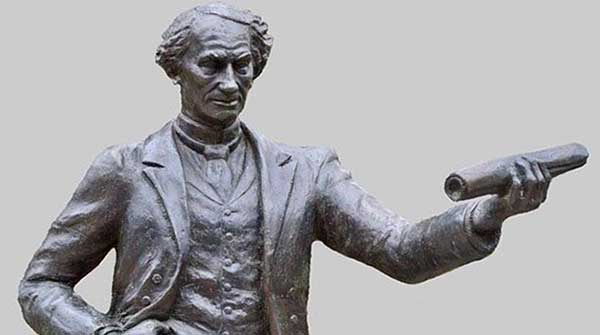 In the interest of righting a genuine and grave historic wrong – the suffering of our Indigenous peoples – the historical hubris of our present Canadian age is distorting history yet again.
In the interest of righting a genuine and grave historic wrong – the suffering of our Indigenous peoples – the historical hubris of our present Canadian age is distorting history yet again.
Enter the City of Victoria and Sir John A. Macdonald. In removing his statue from in front of Victoria City Hall, the denizens of the Garden City have mistakenly attempted to erase history rather than reveal it, in all of its warts and triumphs.
While discovering and teaching our history to every successive generation, we have a duty to teach the whole story. We have a collective responsibility to seek ways to illustrate, through the good and the bad of our history, the nature of our humanity. In so doing, we may reveal again to ourselves a humanity that is fallen, yet that in its true nature is imbued with an aspiration to increase human flourishing and the common good.
If we abandon this responsibility in the interest of advancing a narrow political agenda, a specific ideology, or in a misplaced desire to whitewash history, we fail to serve the common good. Instead, we come to serve our own pride: that we know better; that we would never do what those bigoted Victorians did; that we will bring about a new age of justice and truth.
Well, beware the arrogance of the new age.
If you happen to be one among the chattering classes and historical do-gooders who would consign the likes of Sir John A., Ignace Bourget, Hector-Louis Langevin, Lord Strathcona, Lord Cornwallis, and their associated edifices and effigies to the politically incorrect dustbin, you might very well find yourself unwittingly flirting with some rare historical company. Attempting to cleanse history is a fool’s or, worse, a tyrant’s errand.
On Sept. 21, 1792, the National Convention in revolutionary France abolished the monarchy and declared Sept. 22, 1792, to be 1 Vendémiaire, the first day of Year 1. Everything that came before was anti-revolutionary: monarchy, church, estates, culture was to be dispensed with.
Taking a cue from their former colonial masters, the Khmer Rouge and Pol Pot declared upon their takeover of Cambodia in April 1975 that Year Zero had begun. Informed by a hyper-Marxist, Khmer nationalist and agrarian ideology, the Khmer Rouge embarked upon a destructive process of de-industrialization and re-education that sought to wipe out the existing culture, traditions and social structures, replacing them with a new revolutionary culture.
I don’t believe that we are on that path to ruin – yet. Still, as an American friend of mine recently said, our liberal democracy is a delicate orchid, beautiful yet fragile, and we must ensure that the totalitarian impulse that lurks in every human heart is forever curbed.
If we are to condemn Sir John A. and remove his image from our national life for his central role in establishing the residential schools, then surely we must do likewise for each of his successors as prime minister up until Brian Mulroney, as they were all complicit in the allowing these dens of abuse to persist.
Should we not also rename Montreal’s international airport? After all, it’s named for Pierre Elliott Trudeau, who with Indian and Northern Affairs Minister Jean Chrétien introduced one of the most comprehensive plans ever in Canada to assimilate First Nations peoples: the rightly-reviled White Paper Statement of the Government of Canada on Indian Policy, 1969?
No, we should not rename Montreal’s airport. What we must do is teach and advance the entire history of those who from pre-European contact to the present day have strode across the stage of this country’s history.
We must openly and publicly discuss their failures, but also their great achievements: the Canadian Pacific Railroad, the Charter of Rights and Freedoms, our social safety network and Confederation itself, which has ensured the development of a flourishing liberal democracy.
This liberal democracy permits criticism of our great men and women. It gives us a cultural base from which to learn from our great mistakes while championing our great successes. And with all of its foibles and flaws, it supports a deep pluralism in which we can fundamentally disagree with one another yet still desire to build a common life and to lift each other up.
This nation-building is a uniquely human venture and human beings screw up. Is this liberal democracy perfect?
No. But then again, are we?
Rev. Dr. Andrew Bennett is program director for Cardus Law and director of the Cardus Religious Freedom Institute.
The views, opinions and positions expressed by columnists and contributors are the author’s alone. They do not inherently or expressly reflect the views, opinions and/or positions of our publication.
This site is Powered by Troy Media Digital Solutions


